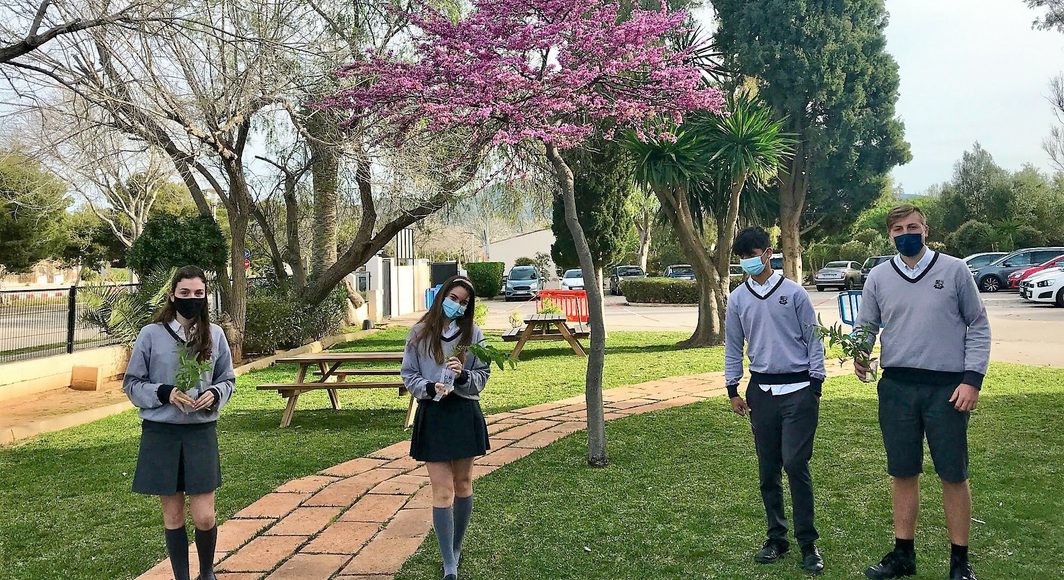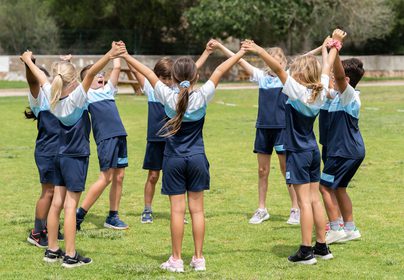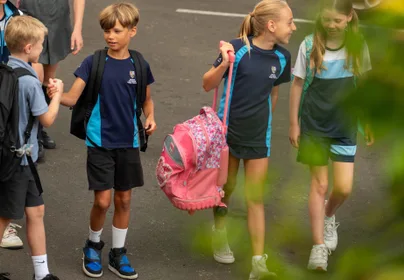Ms Alison Colwell, Principal
Dear families,
Our students in Years 11, 12 and 13 have now begun their GCSE and A'level exams, and we wish them well. Our teachers have been working flat out to prepare them as much as possible, and the students themselves have been showing an excellent attitude to their learning and revising. We are confident of them gaining well-deserved success when the exam results are out in August.
Of course, formal exams are only one part of assessing the learning of our students. Great teaching - and at BIC we have truly great teachers - has the ongoing assessment of progress at its very core. Assessment takes numerous forms, including high quality questioning in class to ascertain what students know and understand, classwork, homework, oral answers, class presentations, quick quizzes, online tests, projects, portfolios, presentations, end of unit tests, essays, and creating diagrams or mind-maps to name but a few. Outstanding teachers use a wide variety of tools to allow them to evaluate and measure the progress of their students, and to plan lessons and units of work accordingly.
Our education system still places a lot of emphasis on formal exams, and there is, in my opinion, a place for them. Even in this internet age, I believe that we do still need to know things - when you go to the doctor you don't want her or him reaching for their manual every time, or saying they'll just need to google your symptoms. However, exams are not the be all and end all. This year we have decided not to have a formal exam week for students in Years 7, 8 and 9 as we would normally. This has not been a normal year, your children have, despite the challenges, received excellent teaching and their teachers are fully aware of the progress they are making, their strengths and weaknesses. We think that in this particular year, there is no need to add something that may cause additional stress - and for many children exams do cause stress. You will, of course, receive an end of year report, the format of which we are currently discussing, because the most important part of any school report is to be able to show where progress has been made, areas where there could be improvement, and - crucially - how your child can make that improvement. What does that level actually mean? What does that number or letter signify? What do they need to do to move up a grade? We will ensure that you have that total clarity when we report on the progress your children have made this year.
Wishing you a good weekend,
Alison Colwell
Principal

Ms Alexandra Tomlinson, Head of Secondary
We are now firmly into the exam season and I am very proud of the way in which Year 11, 12 and 13 have conducted themselves in their exams this week. It is clear that students have really been working extremely hard in preparation for these, demonstrating once again the dedication, tenacity and endeavour that I have come to see so often in all of our students. We still have a way to go but I have every faith and confidence that they will continue to bear themselves with the focus and commitment in which they have begun, ensuring excellent outcomes in August.
With exams also in mind, I am looking forward enormously to welcoming Year 10 parents to our Year 10 Revision Webinar in a few weeks, which is an opportunity to share some top tips for supporting students as they prepare for their important Year 10 mock examinations in June.
Alexandra Tomlinson
Head of Secondary
Secondary Congratulations
Rafael, 7C, for completing an extension homework project in science on the history of electricity over the Easter holidays which he then delivered to the class on the first day back. A lot of effort and work clearly went into this and the class learned some extra knowledge not covered in the syllabus. Stella and Reya, 8B, computer science - for their above and beyond efforts and success in Python coding. Both showed determination and persistence in mastering a difficult skill. Teo, 9B, for making an excellent start in all of his subjects with wonderful contributions in class. Sophia, 10B, for effort and working hard in PE. Nina, 11I, for courage and perseverance in her approach to all of her exam preparation. Jess, Year 13, for her superb school spirit in helping out each week with Shakespeare Club.
Mr John Barter - Head of Sixth Form
Is Science relevant for me?
Students at BIC have a good number of periods of study devoted to science. Why would this be, when most sixth formers at the school do not go on to study science (and when it can be quite hard)? This is not an unusual question for me to receive, but it is an important one. The reasons are many. Science qualifications are highly prized by employers and, as a result, they are generally happy to ensure science graduates are well paid. Those with a background in science tend to be good at problem solving, structured research and analysis; they also know how to present tested evidence in clear and appropriate ways.
However, knowledge of science also helps all of us with our personal health and well-being. My aim is to live to be 100; knowing the science of food and the importance of maintaining physical and mental health helps me towards meeting that ambition. Many of our students go on to do international relations or business studies; a knowledge of scientific evidence and research will enable those students to make better decisions on their courses and in their professional lives, when so much of politics and business is related to understanding, using and applying scientific principles. Our psychology, PE and geography students, amongst others, will be directly using the knowledge gained in science lessons.
Perhaps students should value science because it offers them the chance of legacy, the opportunity to make a long-term difference to people’s lives (eg, solving illness through new found medication, just as scientists have done with the amazing Covid vaccines). Perhaps students should value science because they are naturally curious and find our natural world, and the galaxy beyond, is inspirational. A recent study of scientists in Australia and New Zealand found ‘People don’t go into science for the money and glory. It’s passion for knowledge and science that always attracted me to the field’. So I would say to students ‘If you love it, go for it; you’ll have a really rewarding life when you are constantly learning and being challenged.’
BIC students who love science can study A Levels in biology, chemistry and physics, but, as I have indicated above, a number of other subjects have strong links to the sciences. There are also strong links to maths and ICT; A Level physics students will need a 6 in iGCSE maths and physics as a result.
Those BIC students who study science based A Levels are aiming for university courses (and later, careers) in medicine, nursing, aeronautical engineering and psychology.
If you are interested to know more about choosing a degree and university for a science-based career, these are nice introductions to the range of science options at university, plus internships and jobs related to them:
- https://targetcareers.co.uk/career-sectors/science/315115-choosing-a-degree-and-university-for-your-science-career
- https://www.oxfordscholastica.com/blog/a-guide-to-studying-science-at-university-in-the-uk/
As usual, if you think I can support you or your child with university decision-making, please do contact me.
John Barter
Head of Sixth Form
john.barter@balearesint.net
Duke of Edinburgh International Award
Last Sunday, students taking part in the Duke of Edinburgh International Award ventured on their first expedition. Tackling navigation, teamwork, fitness, nutrition, planning and risk assessment, the students from Year 10,11 and 12 hiked from Cala Figuera to El Toro via the Far de Cala Figuera lighthouse. The Award aims to develop young people by achieving a strength of character, sense of service and appreciation of nature. This week our students certainly had a steep learning experience and, although tired and emotional, are desperately looking forward to our more rigorous second hike taking place next week. We have many exciting trips and adventures planned for the coming weeks and we look forward to sharing them with you here.
Going on the hike was a great experience. It was an excellent opportunity for developing skills, such as teamwork and communication. Although this was primarily a physical activity; we did use our knowledge and initiative. All we had was a basic map, which we used to figure out where we were and where we needed to go. This was a great way to build these skills. It was definitely exciting throughout, especially if we found ourselves feeling a little lost, but then working together to try and get ourselves to the right destination. Of course it was great fun to be with friends, and have a good laugh. However, for me personally, it was really special to have the time to be at one with nature; absorbing the world around me, and reminding myself of how lucky we are to be living on such a beautiful island.Jessica - Year 12 student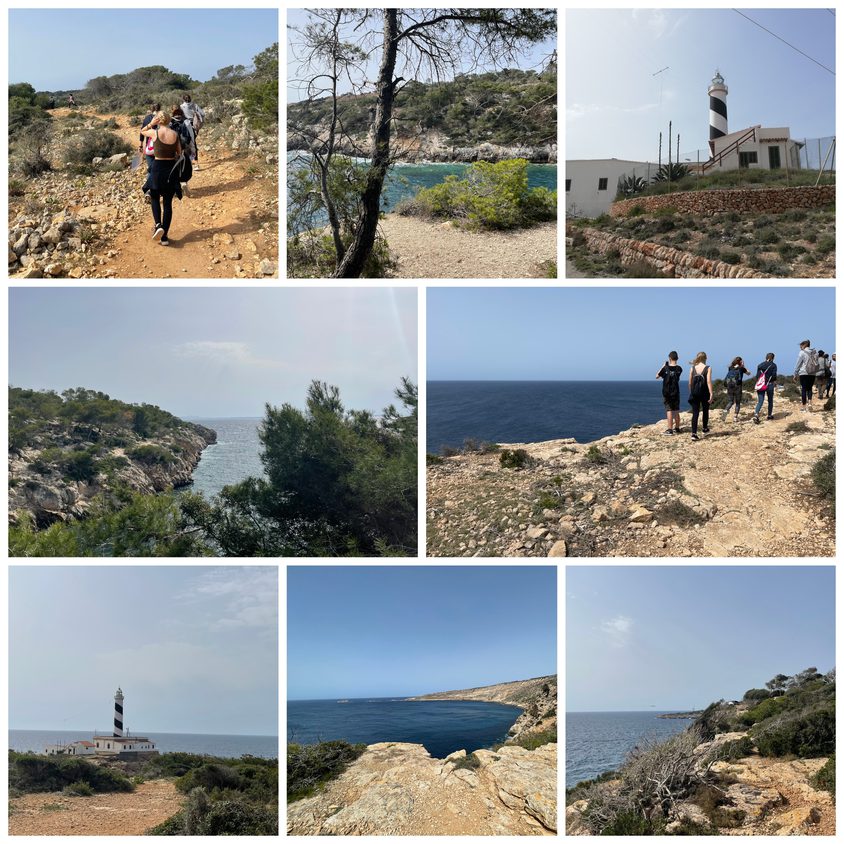
Summer Opportunities offered by Immerse Education
1. Cambridge and Oxford Summer Schools
Designed for exceptional students, participate in leading academic enrichment programmes in Cambridge University or Oxford University colleges this July / August 2021. All programmes are designed and taught by actual university tutors from Oxbridge. For students aged 13-15 and 16-18.
Visit the website to learn more.
2. The Oxbridge Online Research Programme
Personalised, one-to-one programme with your own personal Oxford or Cambridge University tutor. Develop a university-level academic research project in any specialist subject field over 2, 4, or 8 weeks. Ages 13-18.
Visit the website to learn more.
3. Essay Competition for 2022 programmes
Win a scholarship to participate in the Cambridge 2021 academic programmes. Round 1 of the 2022 Essay Competition is now open, with entries closing on 31st August 2021. Ages 13-18.
Weekly highlights - Science at Baleares International College
Our mission here in science at BIC is very simple. Students must be given the opportunity to make sense of the world they live in through a captivating and rigorous science education. Every child deserves the opportunity to be enthralled by science. Every child should have their curiosity nurtured. Every child should be encouraged to dream big.
It is our vision that every child can succeed in science here at BIC. As Mr Barter said, employers and universities truly value students that have a broad and balanced curriculum that includes science subjects.
As we know from the troubles that we have faced over the last year, the study of science is essential for us to prosper. It is for this reason, together with the importance that employers and universities place on science qualifications, that we are focused as a department on delivering a curriculum that meets the needs of our children today, for tomorrow.
We are aware that as parents, you want to support your child in any way that you can from home. With this in mind, we have introduced a mastery curriculum at key stage 3 that supports students in school and at home. Please join us for a Parent Workshop in Science on Thursday 13th of May at 17:00 to find out more about how our curriculum can support you and your family at home.
As scientists we are in complete awe of the world around us and excited by humanity’s quest for discovery and understanding. From the otherworldly crystals of the Naica Caves in Mexico (pictures coming in next week’s newsletter), to the engineering feat of flying a drone helicopter on Mars, science has something for everyone. As a team, we feel fortunate that we are able to help our students find their passions in science as they make their journey through school. We have passionate learners matched by a passion in our team to deliver the best science curriculum on the island, one that matches our school’s ethos of sky high standards.
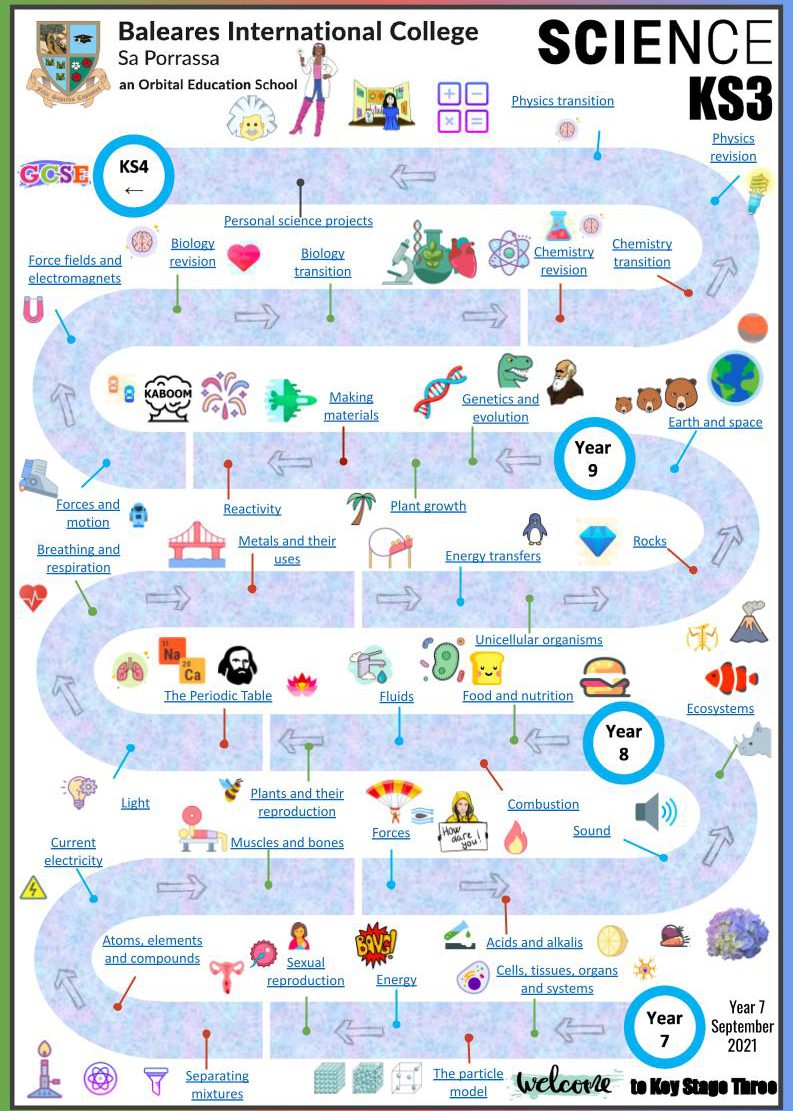
Please take a look at our curriculum plans for the listed years in key stage 3 (and Year 6). Here is an example of one of the help sites that students and parents will be able to access in order to get support. Each circle links to a different help site starting by looking at what the students should know from their previous studies (green) before moving to what they need to know (red). The mastery objectives are underlined. These are the objectives that teachers believe are most important for success at key stage 4. The students can gain further support by revising their knowledge organisers (orange) together with using the memory skills quizzes and games to support learning further. These are live documents and they will change over time in order to meet the needs of our children.
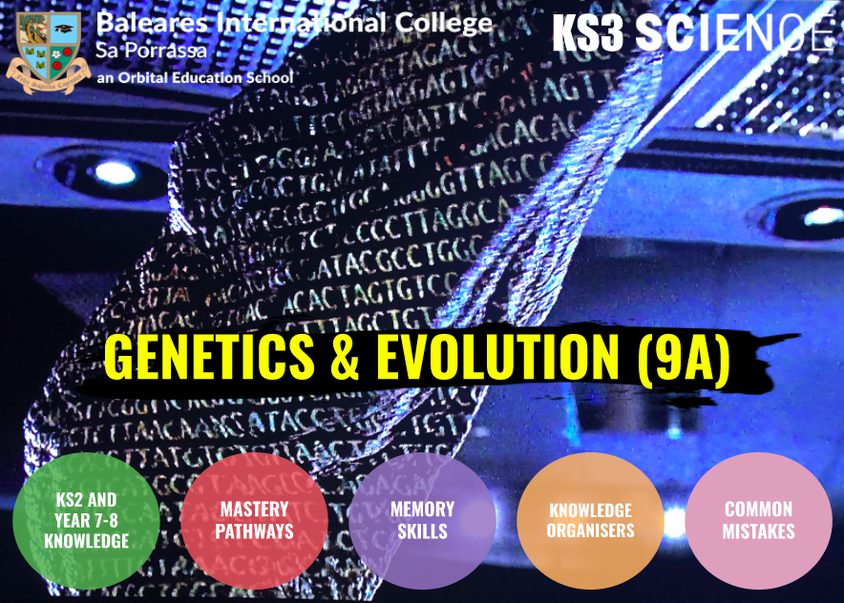
We look forward to welcoming you to our Parent Workshop in Science very soon so that we can work together to support our children.
Key Stage 3
We are lucky to have students who are so enthusiastic about science here at BIC. Similarly, we are fortunate to have wonderful teachers who ignite the imagination of our students. In KS3, our students are passionate about investigating science on their own terms through practical investigation. We aim to nurture an ethos of questioning so that our children do not simply accept what they are told, especially in the age of misinformation! As scientists, we follow the evidence. Your children are scientists and we want them to do the same.
In Years 7, 8 and 9 we offer a bespoke curriculum that is informed but not constrained by the National Curriculum for England. Here you will find a broad overview of what our students have been doing in KS3 science.
Year 7
This week in science, Year 7 have been learning about reproduction in mammals which has created a lot of discussion and interest. As part of the science curriculum and our PSHE programme here at BIC, students have the opportunity to learn about reproduction and the human body.
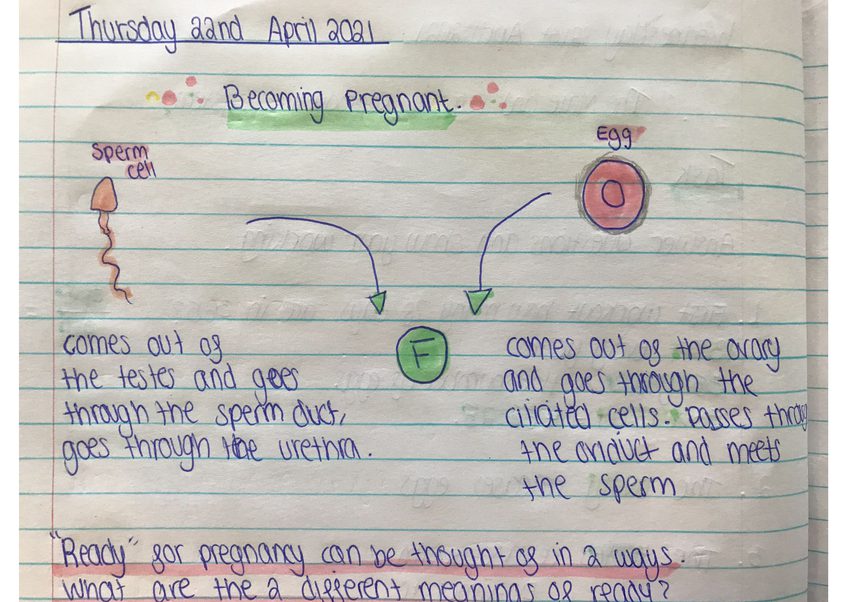
The students started the unit by comparing and contrasting the life cycles of mammals and flies. Year 7 had the opportunity to learn about the work of Francesco Redi (1626-1697). Redi’s groundbreaking experiments allowed the scientific community at the time to move away from their belief that living organisms could manifest from nonliving matter. BIC students recreated his famous experiment and the results have meant that they won't be leaving their food unattended any time soon!
The students placed meat into three jars , one that was open to the air, one with an airtight lid and one covered with permeable cloth.
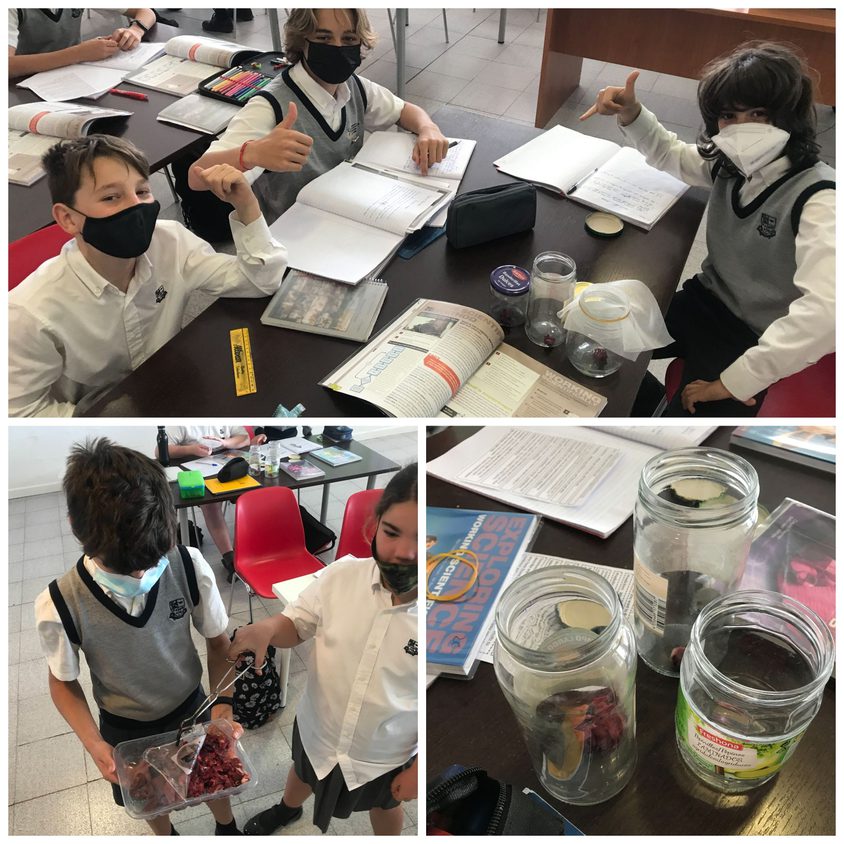
The next challenge was to find a way of securing the investigation, keeping it out of harm's way from cats! A quick trip to the ferreteria worked.
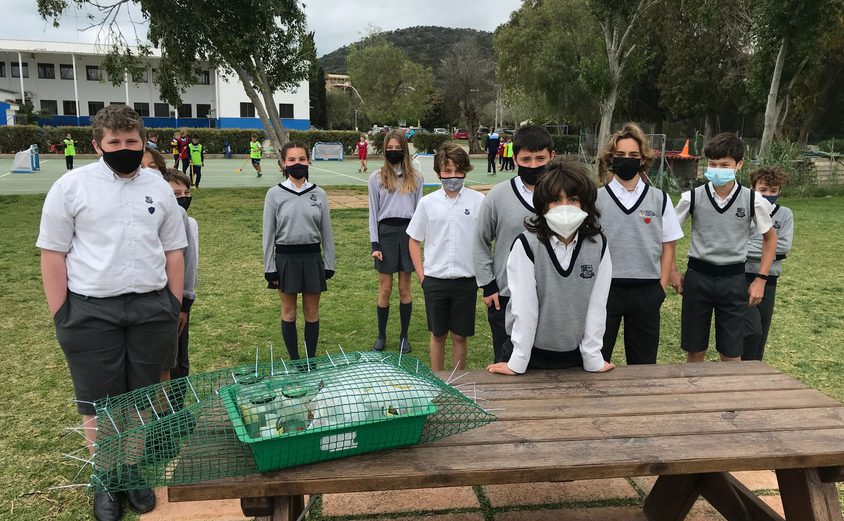
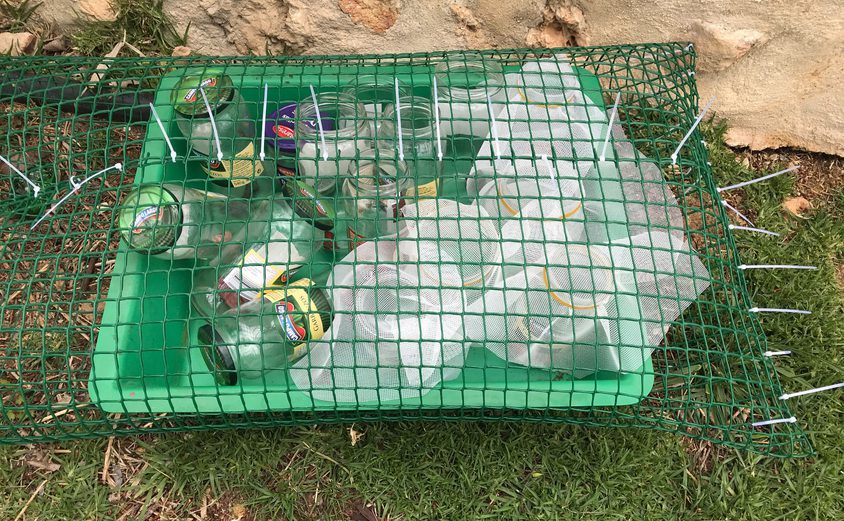
We didn’t have to wait long for nature to take its course...
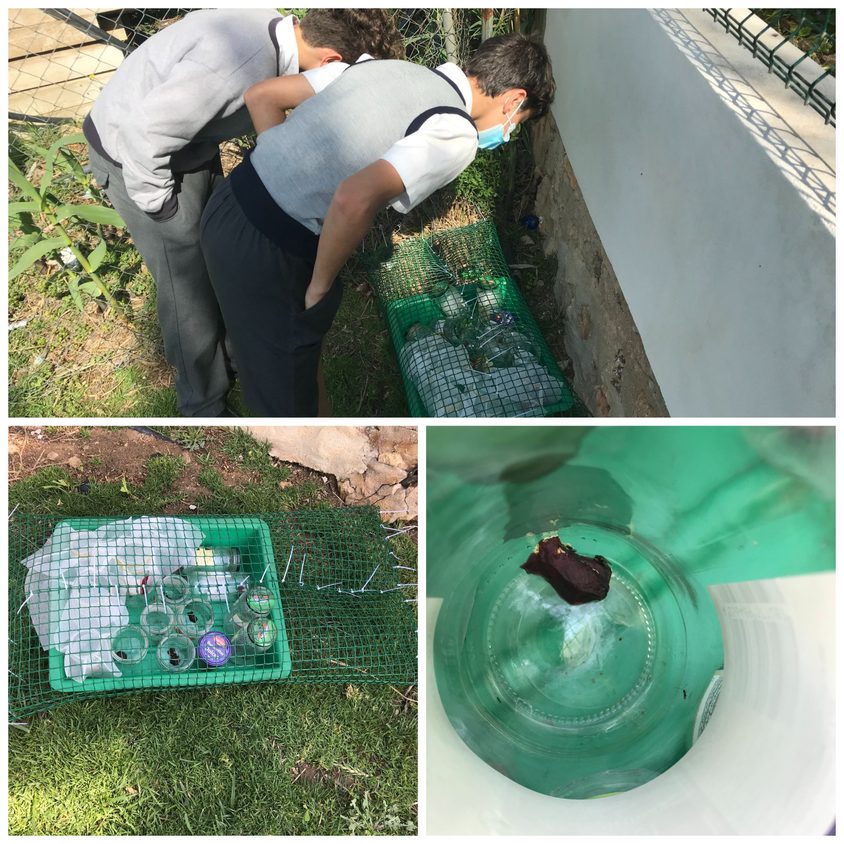
After a week, the students observed that maggots were only found in the open jar due to the fact that flies lay eggs on uncovered food. Keep your barbecues covered please!
Enjoy our video of the results:
Year 8
Recently, Year 8 have been learning about unicellular organisms and their uses. At the start of the unit, the students learned about the challenges that present when organisms become larger. It is one thing to get enough oxygen to the centre of your body if you are a single celled amoeba; it is quite another if you are an elephant. Multicellular organisms rely on systems to provide the raw materials for life. The students were able to investigate form and function using potatoes and iodine to measure diffusion.
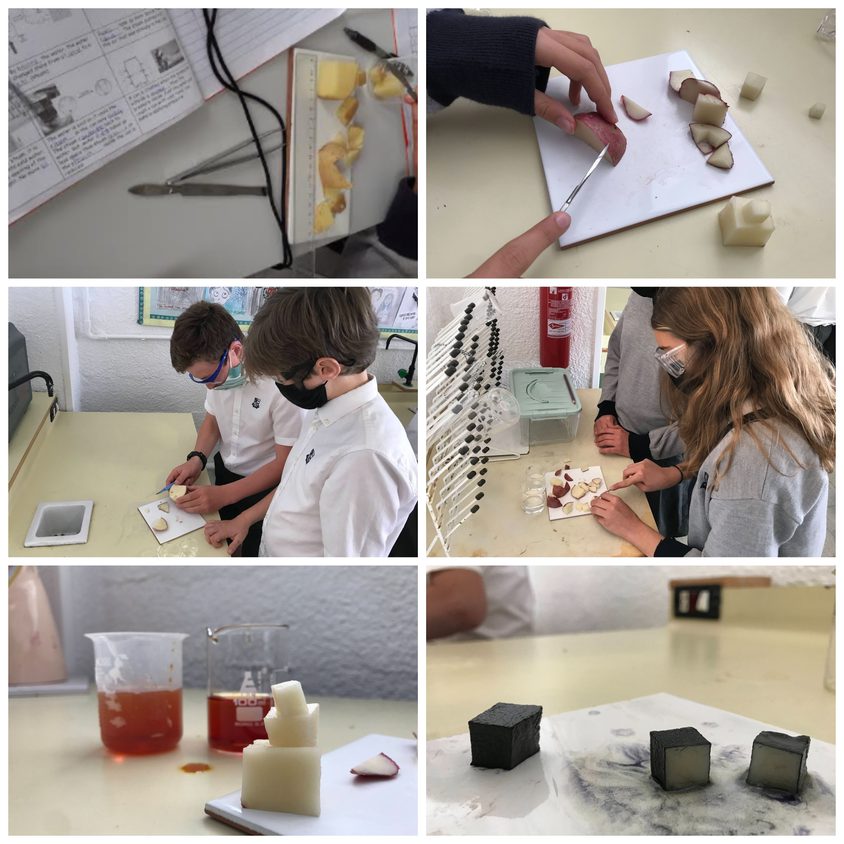
Once the students had enjoyed the opportunity to compare and contrast the adaptations of unicellular and multicellular organisms, they were able to dive deeper into how they are used in everyday life by using yeast to make bread and beer, as well as culturing some bacteria. From our experience of working with Year 8, we believe that we might be seeing the next generation of entrepreneurs of the baking and distilling world! Here are some photos of our students hard at work.
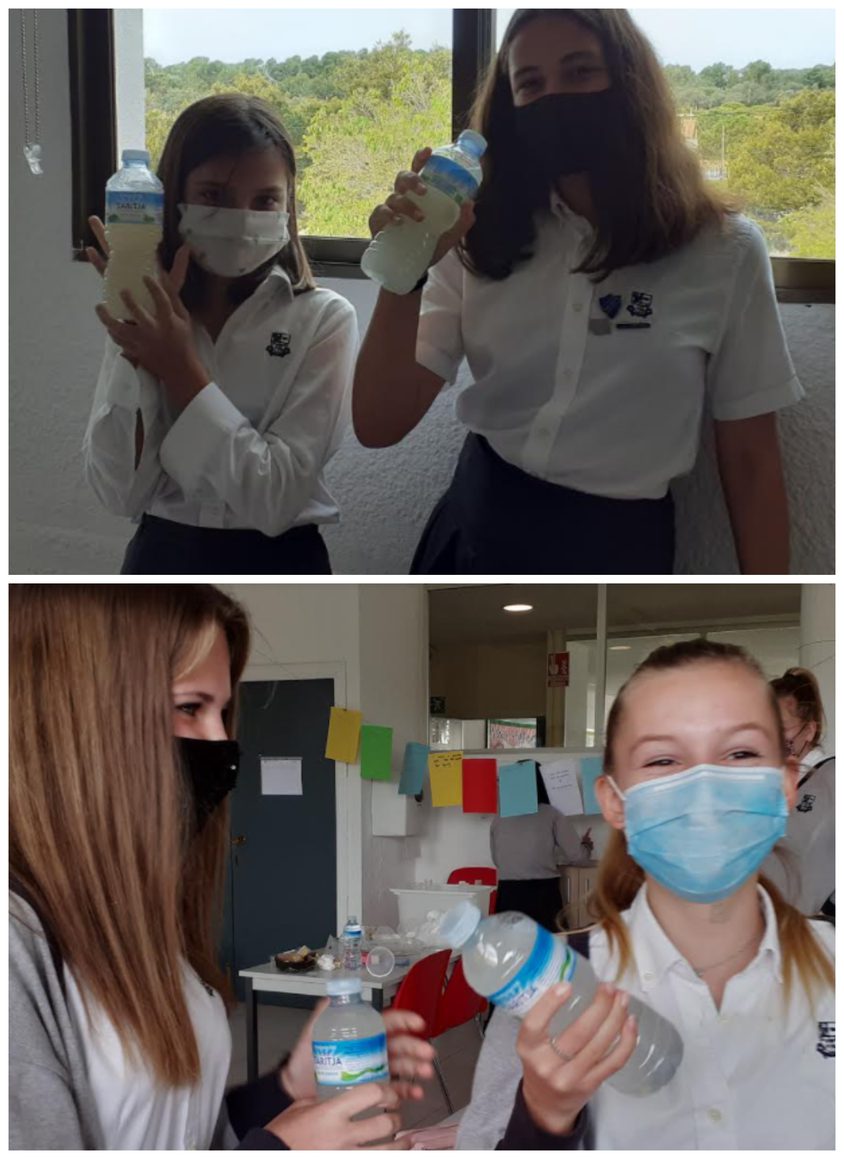
Year 8 have been learning about anaerobic respiration in yeast as they made their own ginger beer. The beer is to test, not to drink!
Looking at the science behind The Great (insert your own nationality here) Bake Off, the students investigated the role of aerobic respiration in dough proofing. I think we can all agree that the one on the right is under-proofed.
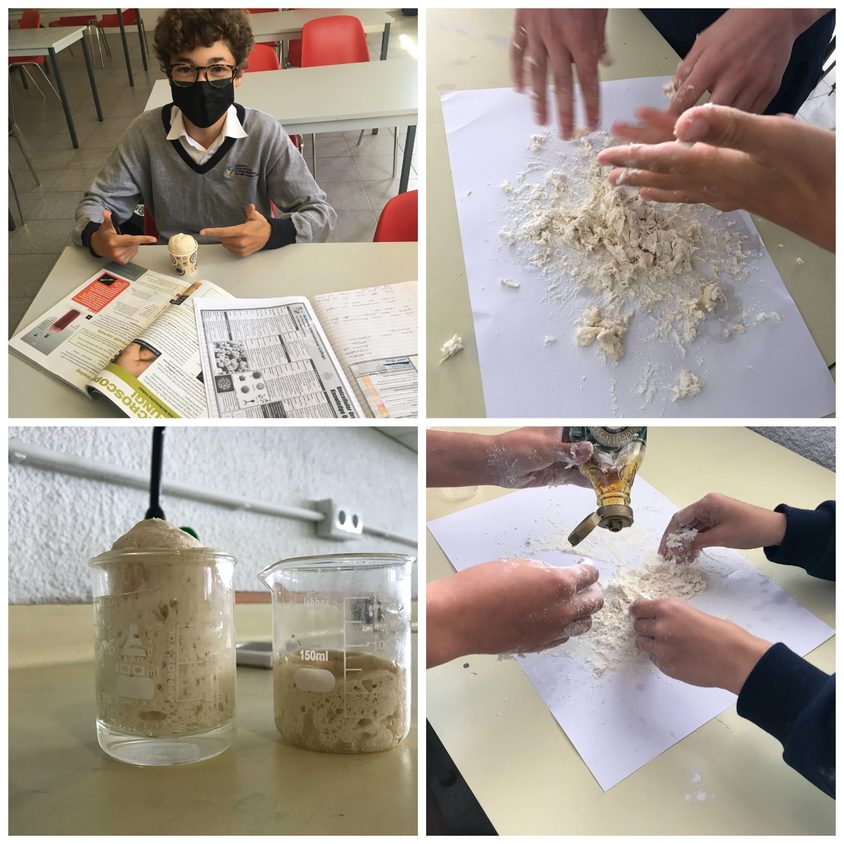
As part of their unit studying unicellular organisms, Year 8 were able to enjoy some cross-curricular learning with the humanities department. The students enjoyed writing about the history of disease through time, using modal verbs to express the degree of certainty in different investigations.
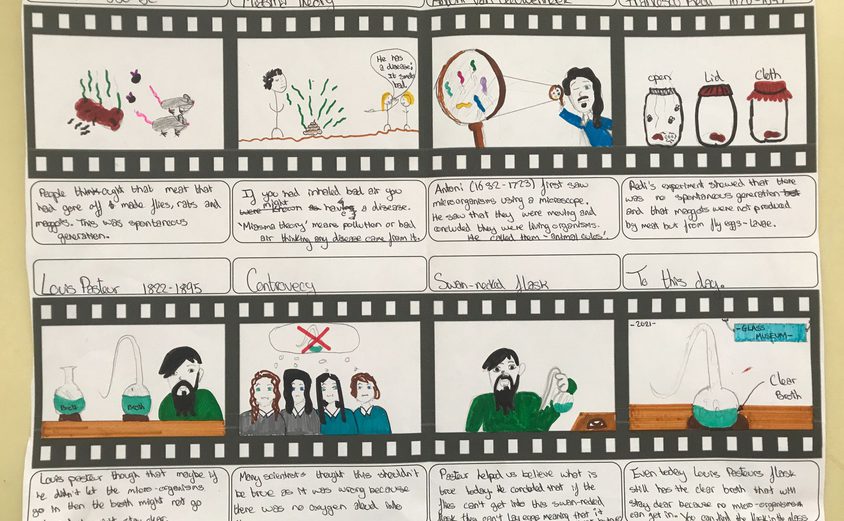
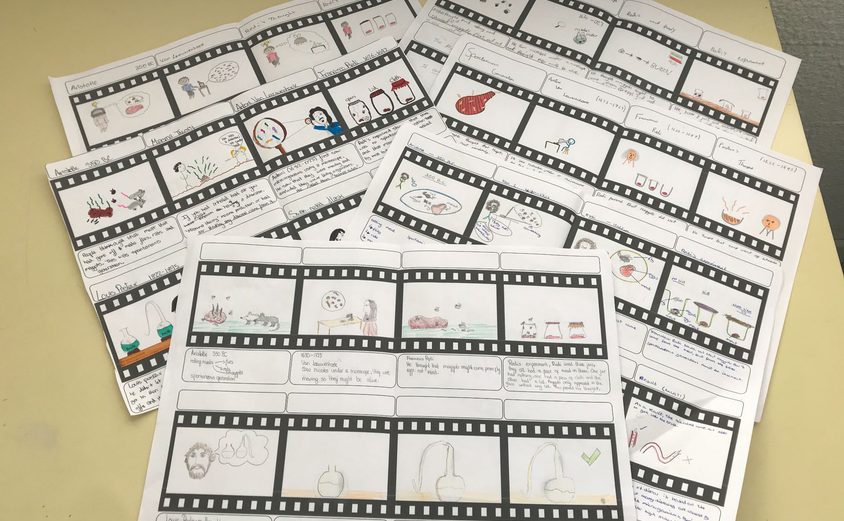
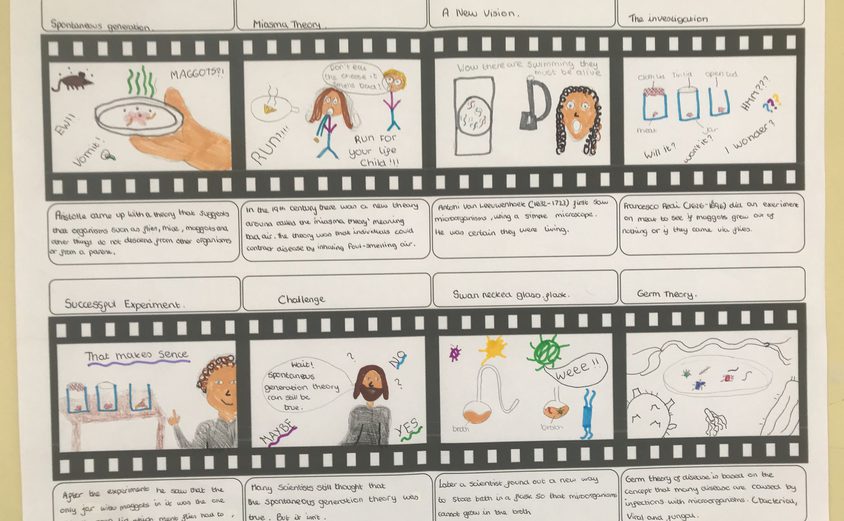
Lastly, Year 8 loved this activity where they had to work in teams to correctly construct atomic models of different elements. Once the music stopped, the students had to pick up the nearest piece of paper, which had an element symbol on it, before returning to their team and drawing an atomic model. This activity allowed them to apply their knowledge of periodic rows, groups, atomic number and atomic mass.
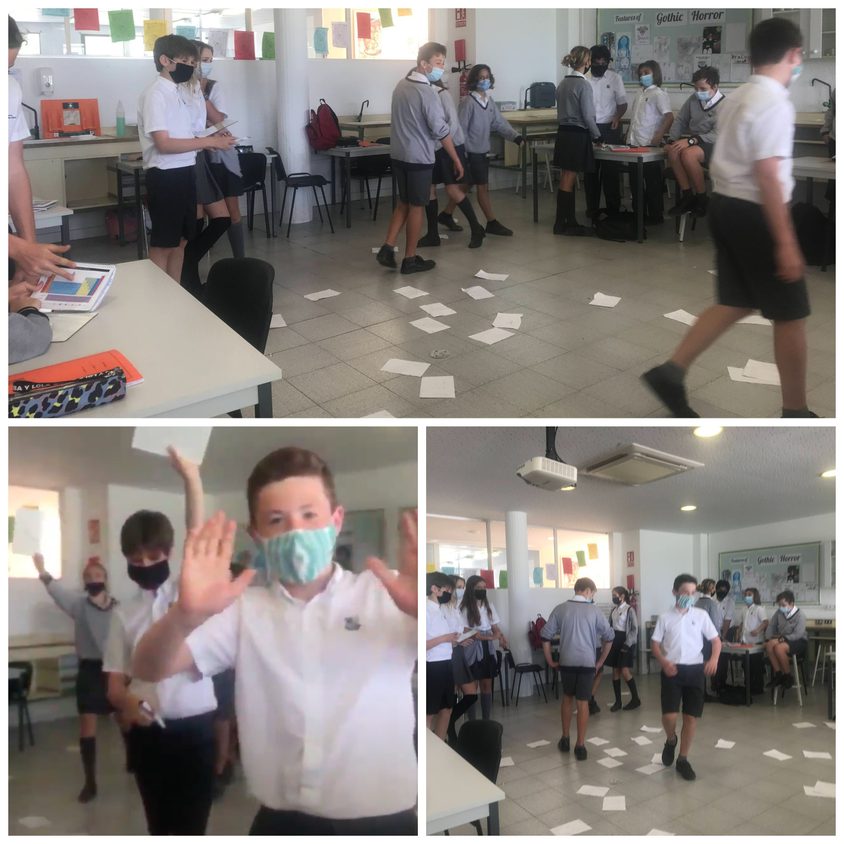
Year 9
This week in Year 9, our students have really benefited from our stunning surroundings here at BIC. After learning about chromatography skills explicitly in class, they were able to apply their skills and knowledge as they separated the different pigments from the many varieties of flowers that we have in our gardens. Here you will see pictures of our students collecting specimens, extracting pigments and performing chromatography.
Summer is here...
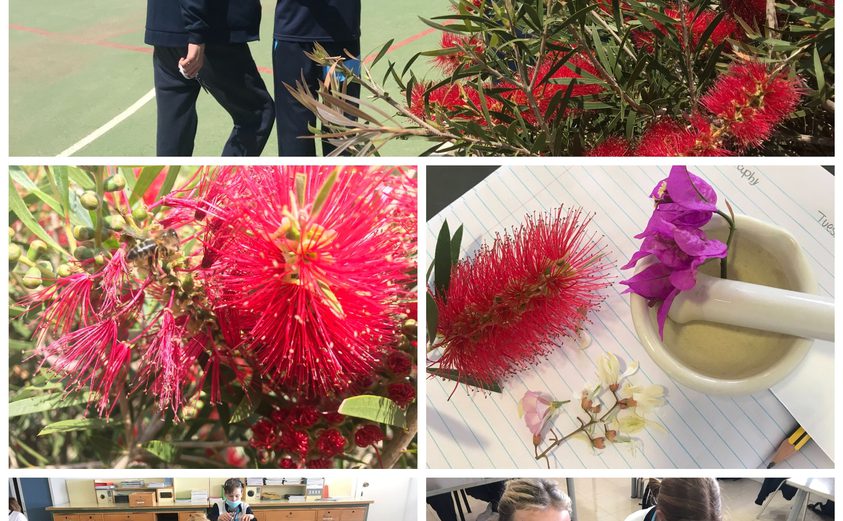
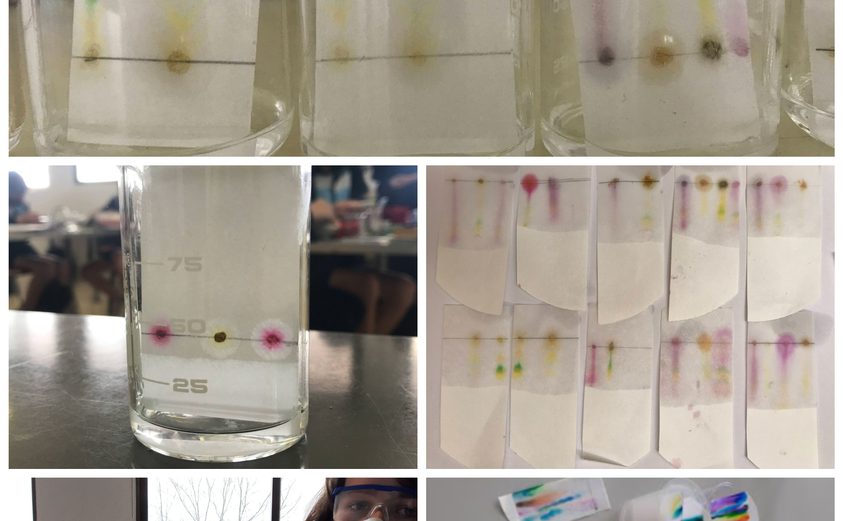
The students in Year 9 also investigated a range of ink samples to identify pure substances and mixtures.
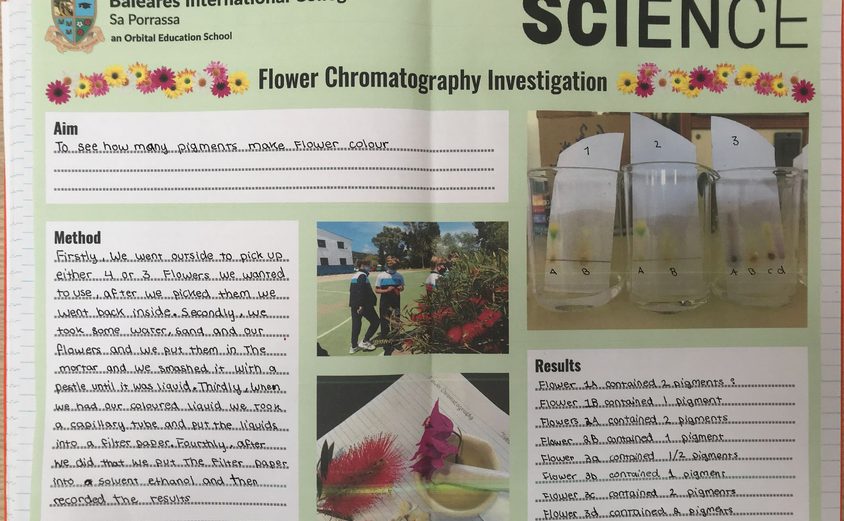
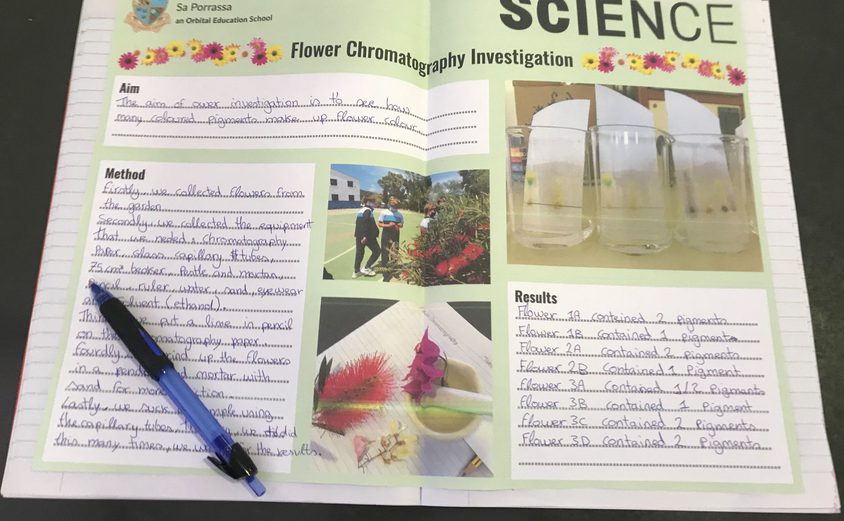
Year 9 have been recapping some of the important chemistry topics that they have studied over the last three years, including acids, alkalis and neutralisation reactions. Henry in Year 9 managed to make a rainbow of colours using acids, alkalis and universal indicator.
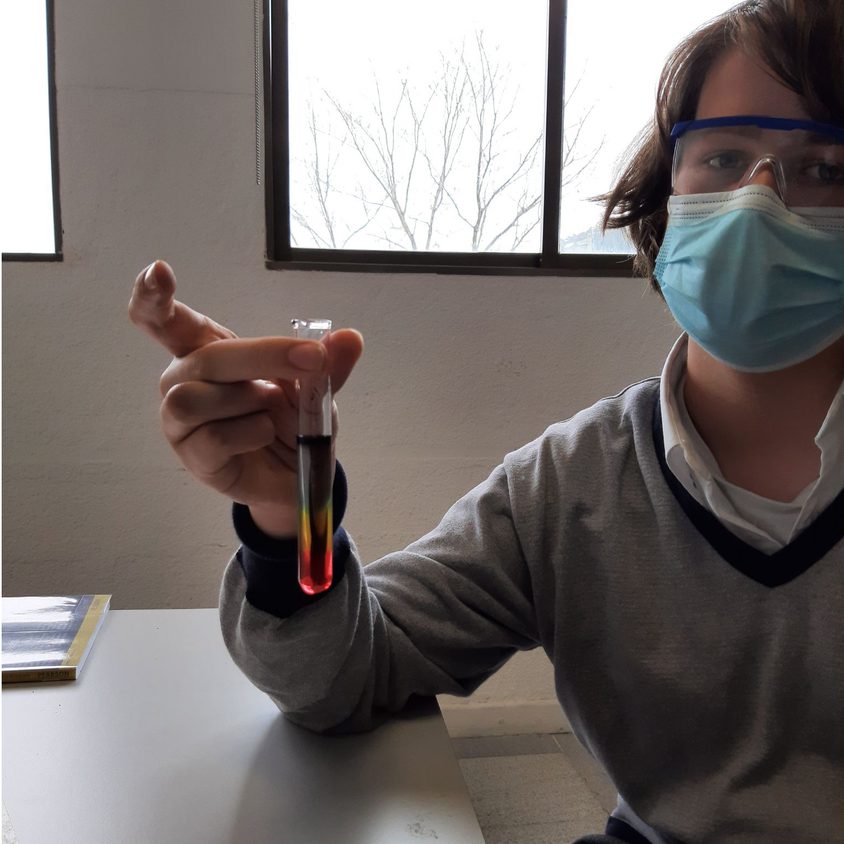
As part of their review of KS3, Year 9 have been consolidating and extending their learning about changes of state, pressure, and separating techniques. Here you will see the students investigate gas pressure in cans during the collapsing can experiment. You will also see the crystals that our students have grown in class.
Take a look at our collapsing can video here.
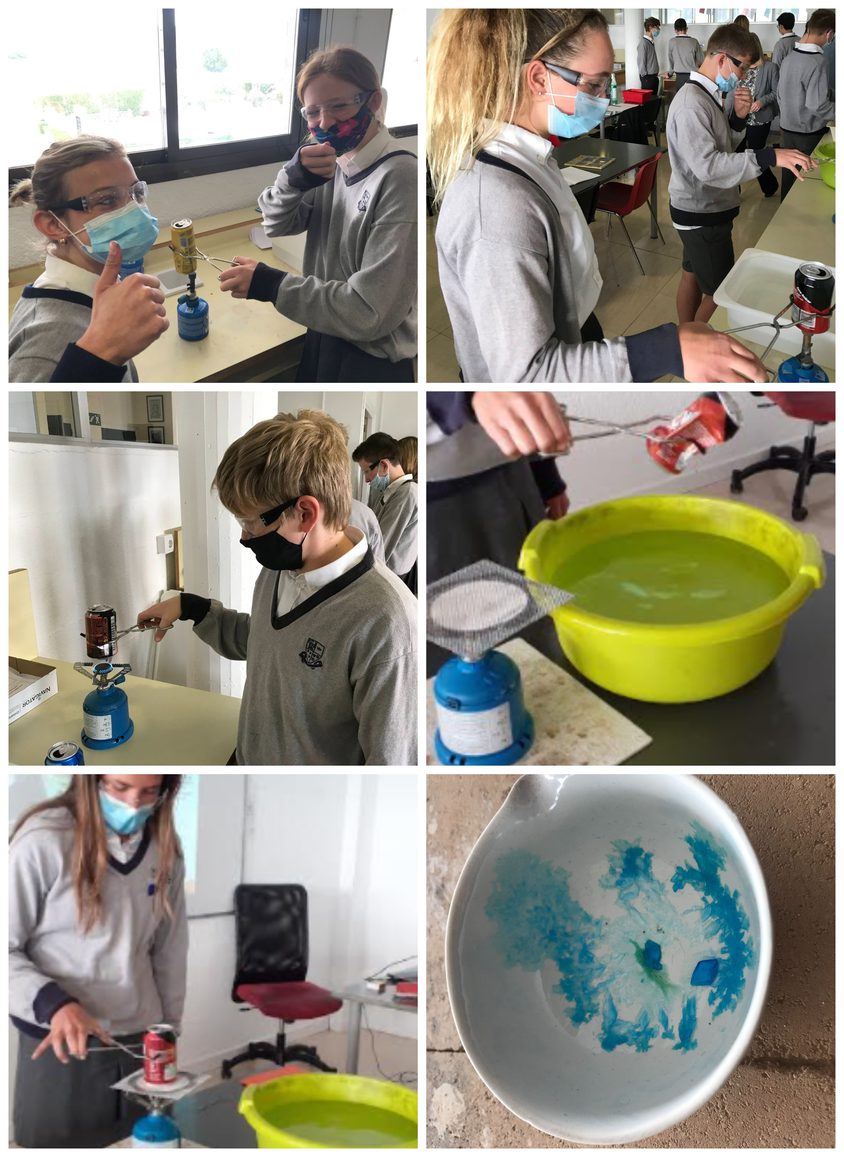
Working as food chemists, Year 9 were able to evaluate the nutritional content information on several brands of crisps. Once again, the students were interrogating data through their own investigations. Here you will see the students collecting data to be used to calculate energy transfer using a mathematical formula from IGCSE.
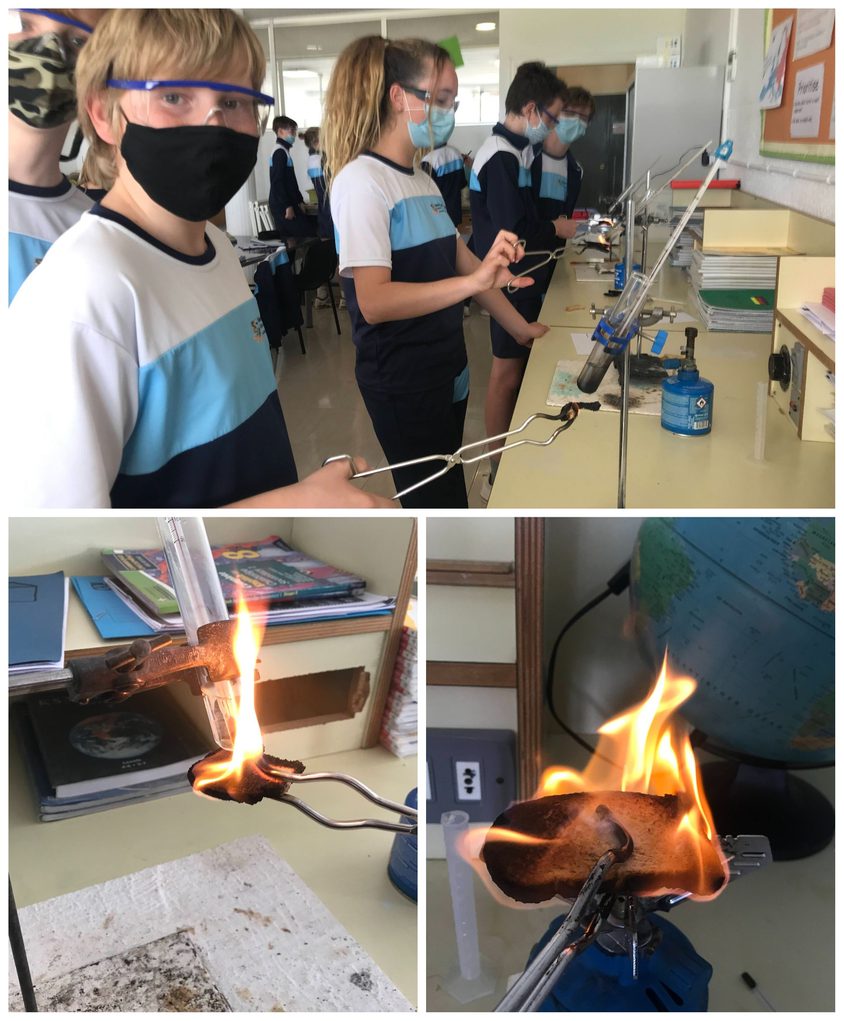
Underpinning our focus on practical work is a foundation based on retrieval support. Here are the students performing a “brain dump” as they reviewed key areas of the KS3 mastery curriculum in science during their transition to IGCSE studies.
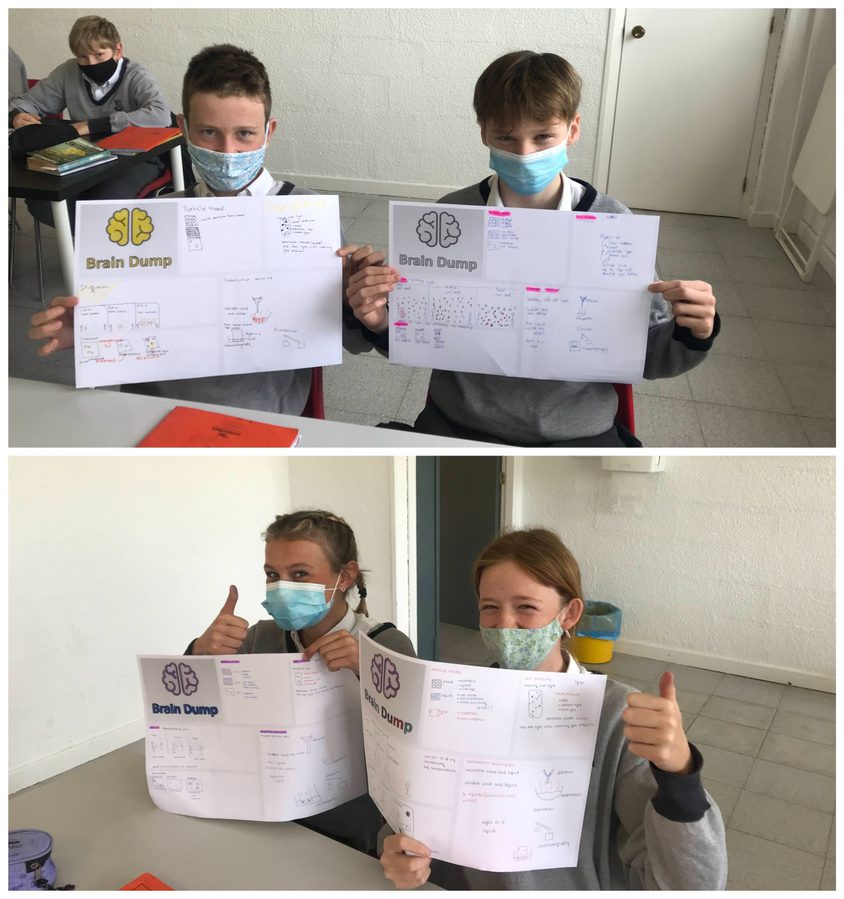
Key Stage 4 and 5
In biology, Year 10 are currently learning about inheritance, cell division and natural selection. The students have been taking a closer look at what makes us who we are - our physical features - and how a small mutation to our DNA can wreak havoc.
Year 11 are hard at work revising for their exams. Recently they were reviewing the heart and circulatory system so they carried out a heart dissection to support their learning. Year 11 also had the opportunity to learn about transport systems in plants. Here you will see them selecting branches to make a potometer in order to measure the rate of transpiration.
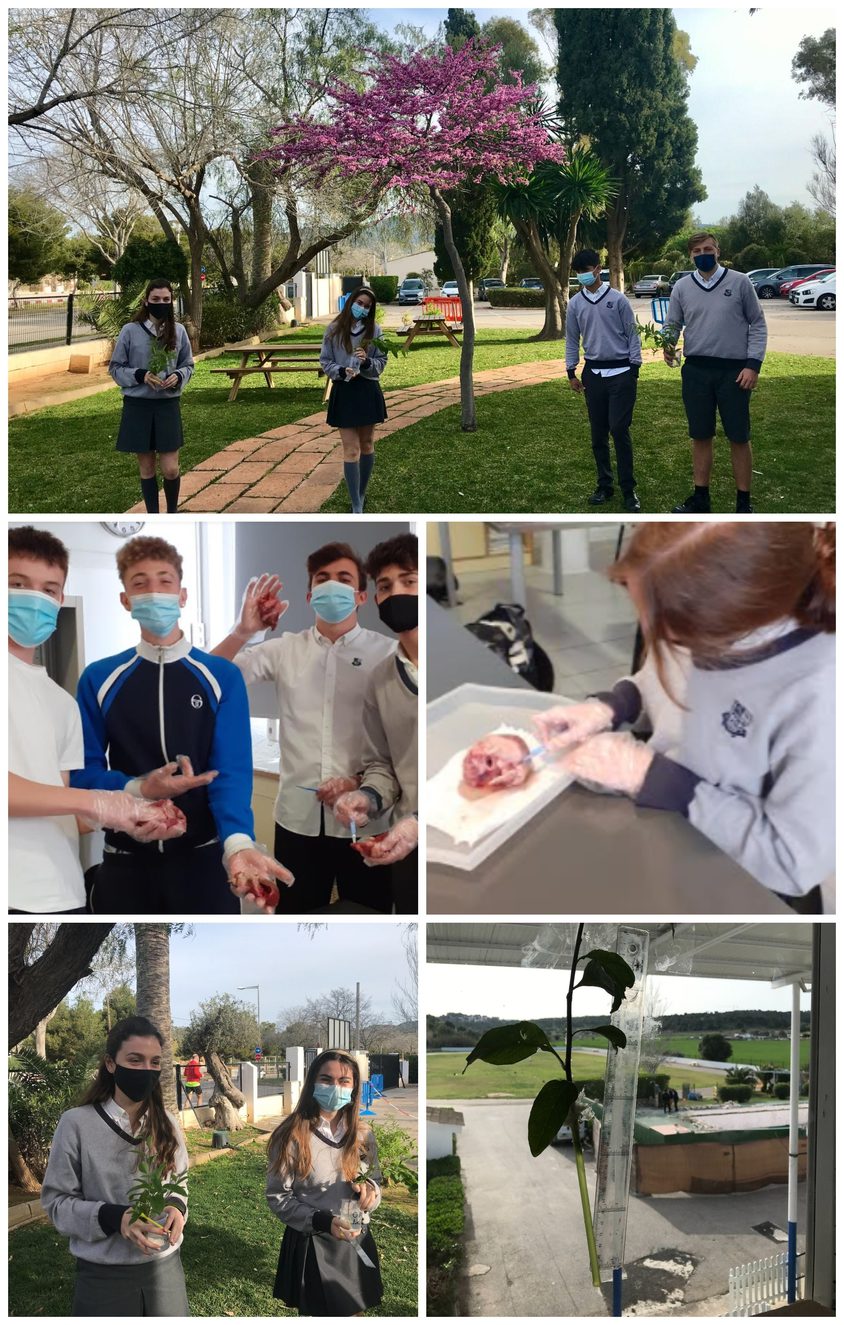
In physics news, Year 10 have been investigating the science behind designing submarines and sublimating iodine and Year 11 have been looking at electromagnetic motors, generators and how the aurora borealis forms.

Year 12 and 13 biologists are currently applying the knowledge learned in class to the core syllabus practicals in preparation for unit 3 and 6 examinations. This is a real opportunity for the students to see how to apply laboratory skills across a range of contexts. Here you will see the students using the semi quantitative test for reducing sugars during nutritional analysis.
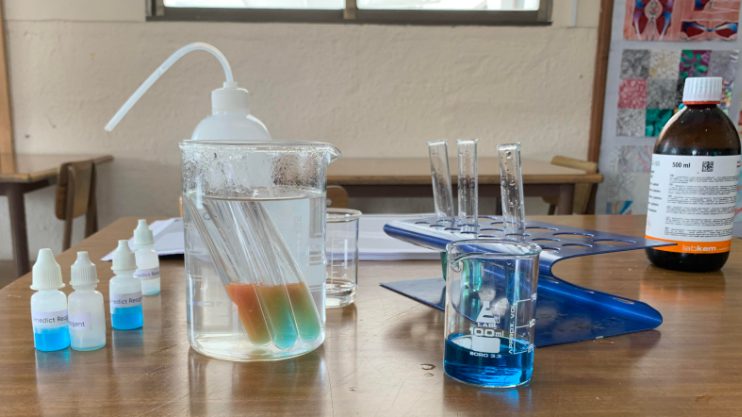
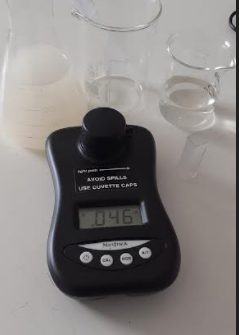
A Level chemistry students have been busily undertaking the core practicals which will help towards their paper 6 assessment coming up soon. The students are able to expertly manipulate the apparatus in order to carry out standard procedures successfully.
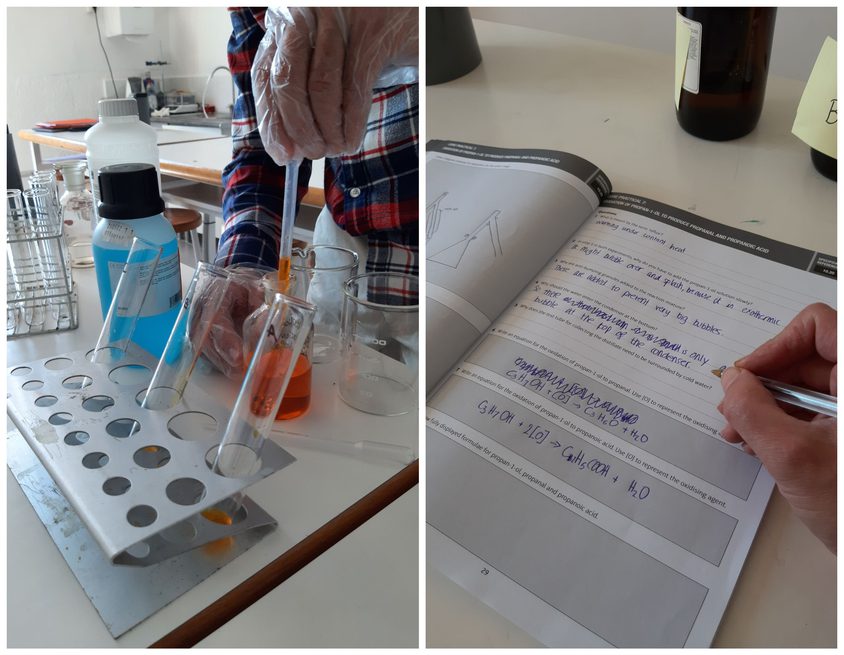
This week in physics, Year 13 made a magnetic mixer! After working on a biology practical involving mixing a yeast solution, Anna and Nacho took it upon themselves to build a magnetic mixer from electronic components. They then demonstrated it to students in Years 8, 10 and 11, leading Mr Warn to claim that this was irrefutable evidence that physics is the best subject ever.
As we said at the start of this newsletter, there is something for everyone in science. Thank you for sharing some of the fun we have been having.
Whole School House System news

House Points Totals Update - Term 3
| Winton | Galileo | Roosevelt | Parks |
|---|---|---|---|
| 94 | 155 | 112 | 102 |
Overall total House Points
| Winton | Galileo | Roosevelt | Parks |
|---|---|---|---|
| 2087 | 2021 | 2200 | 2185 |
Congratulations - Movie Recreation Competition
Congratulations to all students who sent an entry in for our movie recreation competition. We were impressed by all your talent and it was so hard to choose! A lot of effort had gone into all the entries, including props, costumes, makeup, and even getting parents involved! Two House points have been awarded for each student who entered.
- In 3rd place earning 5 House points for Roosevelt we have Cheo Moran from Year 3 and his recreation of ´The Lion King¨
- In 2nd place we have Kai Cumber, Lyla Kibel, and Tia Brereton-Patel from Year 2 all earning 5 House points each for Galileo for their scene from ´Descendants´.
- And finally in first place well done to Geneveive Walsh, Beatrice Fernandez and Eliana Kibel all earning a huge 10 points each for Galileo for their scene from ´Mulan´.

